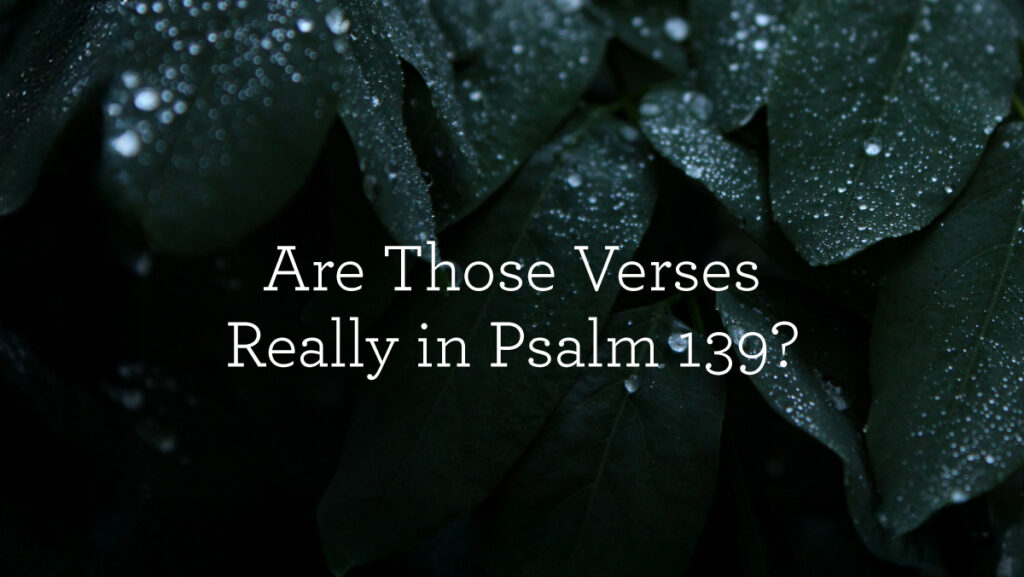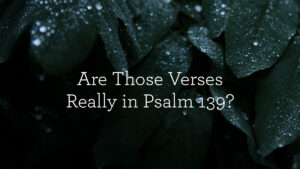Are These Verses Actually in Psalm 139?

Psalm 139 is a valuable psalm, emphasizing the fundamentals of God’s relationship to His youngsters. Within the first six verses, David says (to paraphrase), “God is aware of me intimately”; in verses 7–12, “God is with me continuously”; and in verses 13–18, “God has made me splendidly.”
Verses 19–22, nonetheless, strike what may sound like a discordant word. This part virtually appears misplaced. Of the twenty-four verses within the psalm, there’s no query most would regard these 4 as probably the most tough. Having praised God for His provision in verses 1–18, David then prays for God to guage the depraved:
Oh that you’d slay the depraved, O God!
O males of blood, depart from me!
They communicate towards you with malicious intent;
your enemies take your title in useless.
Do I not hate those that hate you, O LORD?
And do I not detest those that stand up towards you?
I hate them with full hatred;
I depend them my enemies. (Ps. 139:19–22)
To ensure that these verses to make sense, we should learn them inside the context of the whole psalm (to not point out all of Scripture). God is so valuable to David that he finds those that communicate towards God as insupportable.
The precept is easy: When an individual’s world is stuffed with God, like David’s was, he’ll lengthy for the elimination of evil. Like how a father is stuffed with anger towards those that reap the benefits of his youngster, so David despises those that insurgent towards the Lord.
From Psalm 139 we are able to collect a number of rules for serving to us learn the psalms of judgment within the Bible.
The Psalms of Judgment Are Prayers
First, we should always word that in these verses, David directs his phrases to God. The image will not be of the enthroned king shouting at his topics however of a humble man bringing his burden as a petition to the King of kings.
Extra particularly, this psalm is an imprecatory prayer. An imprecation is a curse. These psalms categorical how all opposition to God’s magnificent holiness will sooner or later be destroyed. In a phrase, they’re prayers for divine vengeance, based mostly in God’s personal promise of the identical.
That these psalms are within the Bible in any respect makes some embarrassed. In an effort to elucidate them away, we could be tempted to play the Outdated Testomony towards the New Testomony, saying, “The God of the Outdated Testomony is one in all wrath; Jesus within the New Testomony is stuffed with grace. You gained’t discover something like these cursing psalms within the Gospels or Letters.” However a better take a look at the New Testomony proves in any other case.
All opposition to God’s magnificent holiness will sooner or later be destroyed.
Jesus, for instance, curses the hypocritical Pharisees of His day in Matthew 23:33: “You serpents, you brood of vipers, how are you to flee being sentenced to hell?” Or Paul, writing to the church buildings in Galatia, warns, “If anybody is preaching to you a gospel opposite to the one you obtained, let him be accursed” (Gal. 1:9). Imprecatory prayers are a characteristic of each the Outdated Testomony and the New.
On the identical time, the Bible expressly forbids private vengefulness. Christians are Deuteronomy 32:35 individuals, entrusting all vengeance towards evil into God’s palms. (Importantly, Paul even references this verse in Romans 12:9, making use of the Outdated Testomony precept to New Testomony Christians.)
In affirming each of those truths, there’s a steadiness to attain. On one hand, we pray with David that God would decide the depraved. On the opposite, we additionally entrust that judgment to God alone.
The Psalms of Judgment Are Not Applications
Since vengeance belongs to God, these prayers for judgment are usually not a program for David—or any of us, for that matter—to implement. David, like us, longs for a day when wickedness might be destroyed. However he refuses to take issues into his personal palms.
Regardless of the numerous privileges David loved as king and the numerous alternatives he needed to actual violence towards his enemies, he didn’t do it. Walter Kaiser described the character of David’s enemies in 1 and a couple of Samuel as “the fruits and remaining fruit of all falsehood, greed, hate, cruelty, and treachery aimed towards the very technique of their very own salvation.” Males like Doeg, Cush, and Ahithophel hated David, rejecting God’s anointed king and saving guarantees.
The very fact is that David noticed evil for what it’s: evil. He hated it “with full hatred.” If we’re sincere, it’s tough to offer a voice to that form of expression with out mixing it with private animosity. However God’s Phrase stands. These phrases are a prayer to be prayed with out being a program for exacting private revenge. They’re additionally to be prayed with the information and hope that the depraved can, by God’s grace, nonetheless flip and be saved so long as there’s breath of their lungs.
The Psalms of Judgment Reveal Humanity’s Drawback
Christians studying the imprecatory psalms face a twofold predicament. First, we might be confused in our pondering. Maybe a part of the explanation we hesitate to hope like David did is as a result of we discover it distasteful to confront sin. If we aren’t cautious, we are able to let cultural clichés slightly than biblical rules dictate our worldview.
Trendy Christian within the West, for example, has grown snug with the saying “Love the sinner, hate the sin.” It sounds good—however does it sq. with how David prayed in Psalm 139? He knew he lived in a world wherein evil abounds. For him, evil was not an summary idea; evil revealed itself within the hearts and lives of people. He didn’t distinguish between the sin and the individual committing the sin.
There’s little question that we’re to have compassion on those that are stranded of their sin. On the identical time, we should deliver our fascinated about sin and sinners beneath the jurisdiction of the Bible. It’s concurrently true that God’s wrath is revealed towards all sin and that God’s love extends to responsible sinners (John 3:16, 35).
That we’re confused in our pondering is compounded by a second drawback: We might be compromised in our dwelling. We are able to fail to spot how actually evil evil is, recoiling from God’s judgment. Just like the frog within the kettle that doesn’t notice the water is coming to boil, we are able to slowly drift into an elevated tolerance of the practices that God condemns in His Phrase.
It’s concurrently true that God’s wrath is revealed towards all sin and that God’s love extends to responsible sinners.
The Psalms of Judgment Should Be Learn with Humility
The psalm’s concluding verses commend a posture of humility. Having known as on God to guage the depraved in verses 19–22, David then submits himself to divine scrutiny. He doesn’t confine his assault to the evil round him; he faces as much as the evil that’s inside him:
Search me, O God, and know my coronary heart!
Attempt me and know my ideas!
And see if there be any grievous approach in me,
and lead me in the way in which eternal! (Ps. 139:23–24)
“Search me. Attempt me. Examine for sin in me,” David prays. He acknowledges what we should additionally confess: In our hearts are the seeds of all appalling evil. If we’re to hope as David did, then we should look not solely on the sinfulness round us but additionally to the sinful tendencies that dwell inside us.
In prayer, we should not look solely on the sinfulness round us but additionally to the sinful tendencies that dwell inside us.
We want God’s assist to learn and to hope the psalms of judgment with pure hearts. Maybe we’d do properly to make Paul’s expression of reward our personal prayer:
Oh, the depth of the riches and knowledge and information of God! How unsearchable are his judgments and the way inscrutable his methods! “For who has identified the thoughts of the Lord, or who has been his counselor?” “Or who has given a present to him that he could be repaid?” For from him and thru him and to him are all issues. To him be glory eternally. Amen. (Rom. 11:33–36)
This text was tailored from the sermon “God Judges Righteously” by Alistair Begg.









